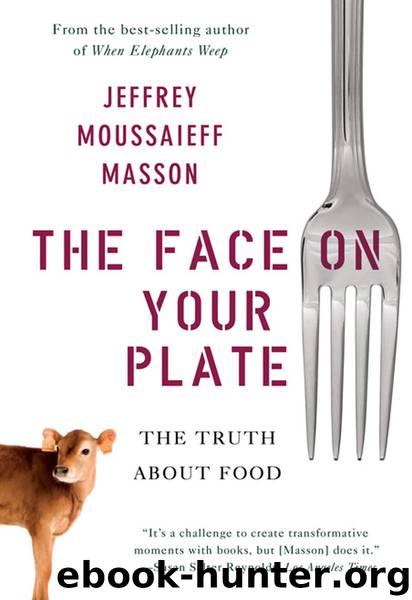The Face on Your Plate by Jeffrey Moussaieff Masson

Author:Jeffrey Moussaieff Masson
Language: eng
Format: epub
Publisher: W. W. Norton & Company
Published: 2009-05-05T16:00:00+00:00
Once again, a professional philosopher refuses to engage his heart at the same time as his head, and leaves behind his imaginative faculty, the very thing that is supposed to raise humans above the beasts. Would anyone ever use the words “smartly banging on the head” for a human or companion animal as a preferred way of death? This is denial as whitewashing.
Denial is such an easy weapon that we are bound to see it misused. Every vegetarian at some point has been told that the carrot he is eating screams just beyond range of his hearing. James Lovelock, the inventor of the modern notion of “Gaia,” offers a more sophisticated version of this retort: “It is surprising how few [people] seem aware that plants dislike being eaten and will go to extraordinary lengths to deter, disable, or even kill any animal or invertebrate trying to eat them.”8 (Examples in the plant world abound: the odorous suite of sulfur compounds in garlic; uncooked caper, the seed capsule of the euphorbia family, can cause disabling pain; chewing on the yew plant can kill humans and animals.) While true, no serious scientist suggests that plants feel pain in anything resembling the degree that humans and animals do. They have no central nervous system; they do not run away; they are not part of a community bound by ties of friendships and loyalties; and they have no visible emotions with which we can empathize. We may well be wrong, but so far no serious research has ever been done to suggest otherwise (in spite of the fanciful conclusions of books like The Secret Life of Plants). The future may prove me wrong. But until such time, to compare plant suffering with the suffering of humans and animals seems morally irresponsible. In fact, I do not believe the rebuke is meant seriously.
We all maintain a remarkable capacity to avoid hearing about atrocities committed by our own side, or by our own species, especially if those atrocities can be hidden from view. It has been said that denial is one of the most powerful forces in the universe. I had the bad idea, many years ago, of approaching families eating at a large steakhouse that was adjacent to a feedlot, and asking them whether they were aware of the presence of the feedlot and how it made them feel about their dinner. I had asked permission of the manager of the restaurant, but after trying a few tables and getting some unprintable responses, both he and I realized we had made a mistake. What I was hoping for was just a bit of clarification. “Would you mind, sir, if I read to you some words of the New England sage Ralph Waldo Emerson? ‘You have just dined, and however scrupulously the slaughterhouse is concealed in the graceful distance of miles, there is complicity.’” It was not, in spite of the extraordinary aptitude of the quote, my finest moment.
What did I expect? I guess a long conversation about the nature of empathy.
Download
This site does not store any files on its server. We only index and link to content provided by other sites. Please contact the content providers to delete copyright contents if any and email us, we'll remove relevant links or contents immediately.
Craft Beer for the Homebrewer by Michael Agnew(18234)
Marijuana Grower's Handbook by Ed Rosenthal(3676)
Barkskins by Annie Proulx(3365)
Project Animal Farm: An Accidental Journey into the Secret World of Farming and the Truth About Our Food by Sonia Faruqi(3212)
Red Famine: Stalin's War on Ukraine by Anne Applebaum(2927)
The Plant Messiah by Carlos Magdalena(2926)
0041152001443424520 .pdf by Unknown(2843)
Organic Mushroom Farming and Mycoremediation by Tradd Cotter(2684)
In the Woods by Tana French(2581)
Beer is proof God loves us by Charles W. Bamforth(2452)
7-14 Days by Noah Waters(2409)
Between Two Fires by Christopher Buehlman(2305)
Borders by unknow(2301)
Reservoir 13 by Jon McGregor(2300)
Meathooked by Marta Zaraska(2255)
The Art of Making Gelato by Morgan Morano(2251)
Birds, Beasts and Relatives by Gerald Durrell(2216)
The 7 Habits of Highly Effective People: Powerful Lessons in Personal Change (25th Anniversary Edition) by Covey Stephen R(2188)
The Lean Farm Guide to Growing Vegetables: More In-Depth Lean Techniques for Efficient Organic Production by Ben Hartman(2131)
